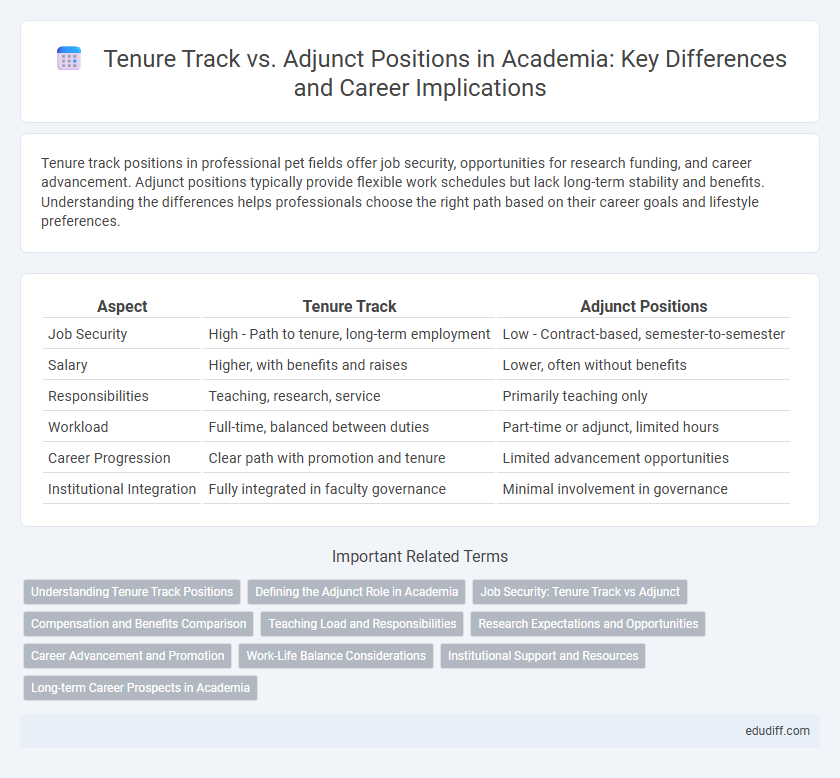Tenure track positions in professional pet fields offer job security, opportunities for research funding, and career advancement. Adjunct positions typically provide flexible work schedules but lack long-term stability and benefits. Understanding the differences helps professionals choose the right path based on their career goals and lifestyle preferences.
Table of Comparison
| Aspect | Tenure Track | Adjunct Positions |
|---|---|---|
| Job Security | High - Path to tenure, long-term employment | Low - Contract-based, semester-to-semester |
| Salary | Higher, with benefits and raises | Lower, often without benefits |
| Responsibilities | Teaching, research, service | Primarily teaching only |
| Workload | Full-time, balanced between duties | Part-time or adjunct, limited hours |
| Career Progression | Clear path with promotion and tenure | Limited advancement opportunities |
| Institutional Integration | Fully integrated in faculty governance | Minimal involvement in governance |
Understanding Tenure Track Positions
Tenure track positions offer a structured pathway toward job security and academic freedom, typically involving rigorous evaluation in teaching, research, and service over a probationary period of six to seven years. These roles often come with benefits such as research funding, sabbaticals, and higher salaries compared to adjunct appointments. Understanding tenure track positions is crucial for early-career academics aiming for long-term career stability and institutional influence within universities.
Defining the Adjunct Role in Academia
Adjunct faculty positions in academia are typically part-time roles that involve teaching specific courses without the research or administrative responsibilities held by tenure track professors. These positions often lack long-term job security and limited access to institutional resources or benefits. Adjuncts provide essential instructional support, allowing universities flexibility in staffing while often balancing multiple professional commitments.
Job Security: Tenure Track vs Adjunct
Tenure track positions offer significant job security through long-term contracts and the possibility of tenure, which guarantees academic freedom and employment stability. Adjunct positions typically lack job security, as they are often contract-based, part-time, and subject to renewal each semester without guarantees. The disparity in employment stability between tenure track and adjunct roles profoundly impacts faculty career planning and institutional loyalty.
Compensation and Benefits Comparison
Tenure track positions typically offer higher base salaries, comprehensive benefits packages including health insurance, retirement plans, and paid sabbaticals, whereas adjunct roles often provide lower pay with limited or no access to benefits. Tenure track faculty enjoy job security and eligibility for research funding, while adjuncts work on a contract basis with minimal institutional support. Compensation disparities reflect differences in responsibilities, institutional commitment, and long-term career advancement opportunities.
Teaching Load and Responsibilities
Tenure track positions typically require a balanced mix of research, teaching, and service, with teaching loads averaging 2-3 courses per semester to allow time for scholarly activities. Adjunct instructors often carry heavier teaching loads, sometimes exceeding 4 courses per semester, focusing primarily on classroom instruction without research or institutional service obligations. This distinction influences job security, academic freedom, and long-term career development in higher education.
Research Expectations and Opportunities
Tenure track positions prioritize sustained, high-impact research output with access to substantial funding and institutional resources, fostering long-term scholarly contributions. Adjunct roles typically emphasize teaching responsibilities, offering limited research opportunities and minimal support for grant acquisition or lab facilities. Faculty on tenure track benefit from structured mentorship and collaboration networks, enhancing the potential for publishing in top-tier journals and securing career advancement.
Career Advancement and Promotion
Tenure track positions offer clear pathways for career advancement through rigorous evaluation criteria including research, teaching, and service, leading to potential tenure and promotion to higher academic ranks. Adjunct positions typically lack formal mechanisms for promotion or long-term job security, limiting opportunities for professional growth and institutional recognition. Faculty in tenure track roles benefit from structured support and resources that enhance their prospects for upward mobility within academia.
Work-Life Balance Considerations
Tenure track positions often provide greater job security and structured schedules, which can enhance work-life balance by reducing stress related to contract renewals. Adjunct positions, while offering flexible hours, frequently involve unpredictable workloads and limited access to benefits, impacting overall stability and personal time management. Evaluating these factors is crucial for academics prioritizing sustainable work-life integration in their careers.
Institutional Support and Resources
Tenure track positions typically offer greater institutional support and access to resources, including research funding, dedicated office space, and professional development opportunities, enhancing faculty stability and academic growth. Adjunct positions often lack consistent institutional backing, with limited access to resources and minimal support for research, affecting job security and career advancement. Institutions prioritize tenure track faculty when allocating resources to foster long-term contributions to scholarship and teaching excellence.
Long-term Career Prospects in Academia
Tenure track positions offer structured paths for long-term career advancement and job security in academia, featuring opportunities for research funding, promotions, and tenure. Adjunct roles typically lack these benefits, offering limited access to institutional resources and minimal job stability, which can hinder sustained scholarly development. Long-term career prospects heavily favor tenure track appointments due to their emphasis on academic growth, institutional commitment, and competitive compensation packages.
Tenure Track vs Adjunct Positions Infographic

 edudiff.com
edudiff.com